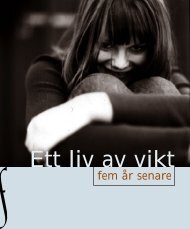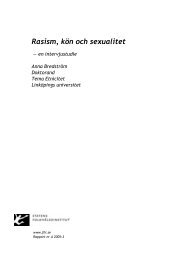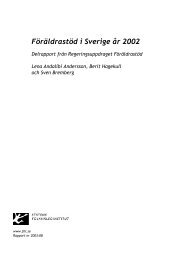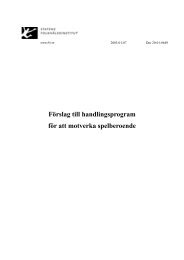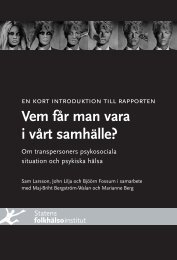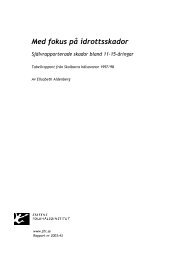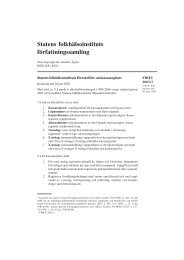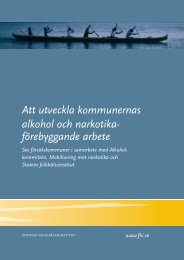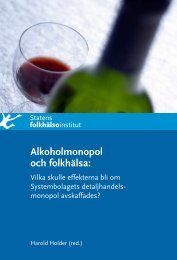Gambling motivation and involvement: A review of social
Gambling motivation and involvement: A review of social
Gambling motivation and involvement: A review of social
Create successful ePaper yourself
Turn your PDF publications into a flip-book with our unique Google optimized e-Paper software.
105, 60, 141–145]. The Friedman <strong>and</strong> Savage hypothesis has undergone theoretical<br />
modification with various tweaks <strong>and</strong> wiggles in the utility function <strong>and</strong> the introduction<br />
<strong>of</strong> other factors in making choices under uncertainty that influence the shape <strong>of</strong><br />
the function [136, 137, 146]. The hypothesis has also been applied more broadly to<br />
gambling, with a focus on lifestyle improvement rather than qualitative change in<br />
socio-economic status. <strong>Gambling</strong> is rational if it <strong>of</strong>fers the possibility <strong>of</strong> such improvement<br />
from any level in the income distribution, especially if people perceive that there<br />
are few realistic possibilities to achieve it, i.e. through working hard or finding a better<br />
paid job. This “weak” version <strong>of</strong> the hypothesis is said to have been embraced by<br />
Friedman himself in the 1970s (F. Pryor, personal communication).<br />
Alternatives to the Friedman-Savage theory have been proposed, which retain the<br />
basic assumptions <strong>of</strong> rational actors <strong>and</strong> that the individual’s <strong>motivation</strong> for gambling<br />
is solely monetary gain, but assume utility functions that are quite different.<br />
The most influential <strong>of</strong> these approaches is prospect theory [34], which maintains<br />
that the utility function is shaped not primarily in relation to absolute wealth levels<br />
but by relative changes in wealth [147]. Prospect theory holds that, in risk taking<br />
decisions, individuals first order possible outcomes according to various heuristics<br />
<strong>and</strong> then, in a second phase, evaluate outcome probability in terms <strong>of</strong> relative gains<br />
<strong>and</strong> losses (rather than absolute wealth). On the basis <strong>of</strong> this calculation, they make<br />
a rational choice by choosing the option with the highest utility. Prospect theory<br />
predicts that individuals are willing to partake in gambling for small probabilities,<br />
such as lotteries with a small chance <strong>of</strong> a huge jackpot win. Similarly to other economic<br />
approaches that assume rational behavior <strong>and</strong> that the gambler’s <strong>motivation</strong><br />
only concerns the chance to win money, however, prospect theory generally<br />
fails to account for people participating in a variety <strong>of</strong> games with different payout<br />
schemes, probabilities <strong>of</strong> winning, <strong>and</strong> sizes <strong>of</strong> top prizes [146]. In order to account<br />
for this, a process utility <strong>of</strong> gambling must be introduced (see below).<br />
RELEvancE tO pRObLEm GambLinG StudiES<br />
The Friedman-Savage theory <strong>of</strong> expected utility, as well as prospect theory, accounts<br />
for the <strong>motivation</strong> some people have for participating in lotteries <strong>and</strong> other forms <strong>of</strong><br />
gambling with low stakes <strong>and</strong> the chance <strong>of</strong> winning huge sums <strong>of</strong> money. The motive<br />
is the hope <strong>of</strong> gaining money that will enable <strong>social</strong> advancement or lifestyle improvement<br />
in general. Apparently, the theories can to some extent predict different levels <strong>of</strong><br />
<strong>involvement</strong> in this type <strong>of</strong> gambling across socio-economic groups. As to other forms<br />
<strong>of</strong> gambling, the theory is <strong>of</strong> little relevance. On gaming markets with a diversity <strong>of</strong> products<br />
– including slot machines, sports- <strong>and</strong> horse betting <strong>and</strong> casinos – lotteries are<br />
seldom closely associated with excessive gambling <strong>and</strong> then classical expected utility<br />
theory does not contribute much to problem gambling studies.<br />
28 G A M B L I N G M O T I VAT I O N A N D I N V O LV E M E N T



